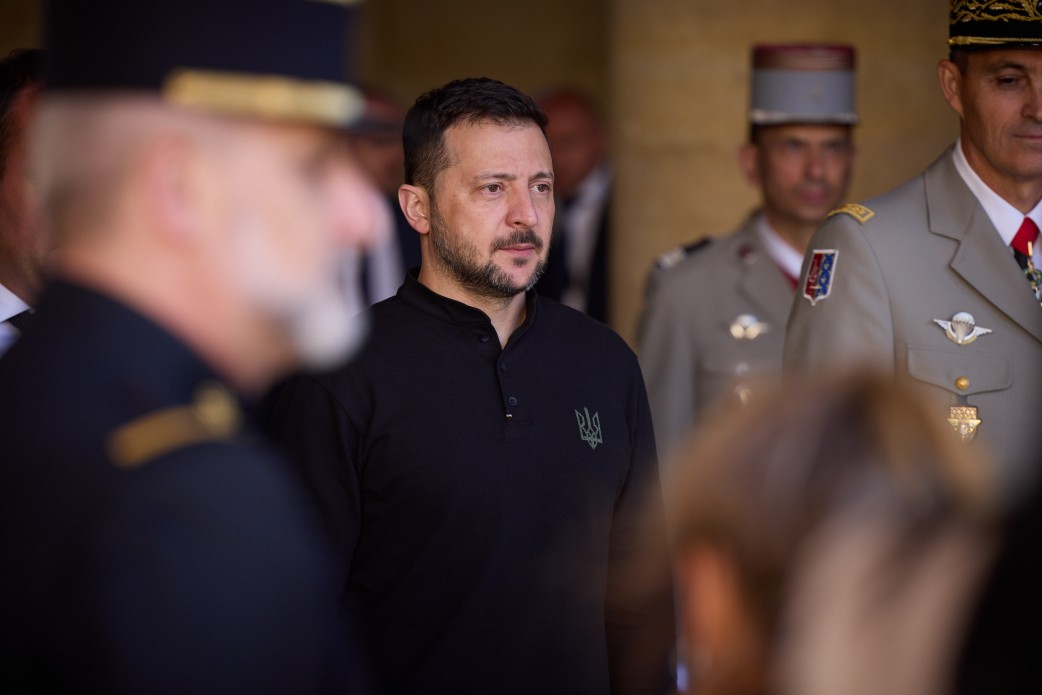
Russian Psyops Target Zelenskyy’s Legitimacy
Russian Psyops Target Zelenskyy’s Legitimacy
Executive Summary:
- The Russian special services are conducting a broad disinformation campaign in disseminating an alleged narrative of Ukrainian President Volodymyr Zelenskyy’s illegitimacy.
- The primary goal of these psychological operations is to undermine unity within Ukrainian society and dissuade further Western support for Ukraine.
- A vast network of information resources has been created to disseminate the Russian regime’s narratives to the Western audience, which the European Union and other Western governments continue to sanction the entities involved.
On May 24, Russian President Vladimir Putin alleged during a press conference that Volodymyr Zelenskyy cannot be considered the legitimate president of Ukraine as his presidential term expired on May 20 and no new elections have been held. In Putin’s opinion, the Peace Summit in Switzerland was organized to convince the world of Zelenskyy’s presidential legitimacy and preserve his status, (Kremlin.ru; The Moscow Times, May 24; see EDM, June 6). The Kremlin leader’s statement can be seen as an attempt to add official confirmation to the Russian disinformation campaign targeting Zelenskyy, which has long been ongoing. According to the Ukrainian Intelligence Committee under the president of Ukraine, this campaign could be part of a “Maidan-3” operation aimed at challenging the legitimacy of government decisions made in Ukraine after May 20, spreading panic and despondency, artificially opposing civilians and the military, and highlighting Ukraine’s quarrels with its allies (Spravdi, February 27). The Kremlin aims to sow chaos and distrust both between the Ukrainian people and their own government and Ukraine’s Western allies and Kyiv to provide Moscow an advantage both on and off the battlefield.
In truth, Zelenskyy remains the legitimate president of Ukraine based on the country’s own laws and constitution. According to the first part of Article 19 of Ukrainian law, “On the legal regime of martial law,” no elections, including parliamentary and presidential, can be held during martial law (Zakon.rada.gov.ua, accessed June 11). The impossibility of holding elections is also enshrined in the Ukrainian Constitution (Zakon.rada.gov.ua, accessed June 11).
The Center for Strategic Communications of the Ukrainian Ministry of Culture and Information Policy published a study on the risks of holding elections during the war. According to the study, major reasons for not holding elections include: security issues for voters, as crowds could be easily targeted with a Russian air strike; the absence of legal precedent according to Ukrainian law; a lack of access for all potential voters, as some have left the country and others are living under occupation; the inability for the election to be recognized by the international community; and the high costs of the elections at a time when Kyiv desperately needs money to fund the defense of the country (Spravdi, February 29). According to Ukrainian political scientist Roman Kyslenko, another reason is that elections or any political competition could cause a split in society, which, in the context of the war, could have highly negative consequences and lead to internal destabilization (Ukrinform, December 2, 2023). Both options of alleged illegitimacy without elections and destabilization with elections are precisely what the Russian special services want to exploit.
Russian psychological operations on Zelenskyy’s legitimacy began in 2023. Most efforts, however, have been concentrated around May 20, when Zelenskyy’s term would have ended if not for the war. Kremlin-controlled media and opinion leaders have actively spread theories about the alleged end of the Ukrainian president’s term and therefore his legitimacy. Some trolls have even called for protests and uprisings against the allegedly illegitimate government (Ukrinform, May 22). In particular, Alexander Dugin, one of the leading ideologues of Putin’s regime, wrote on his Telegram channel, “Starting tomorrow, large-scale preparations for the uprising against the illegal and illegitimate dictatorship of the bloody clown begin throughout the still-unliberated territory of Ukraine. … From this moment [May 20] on, in Moscow’s view, [Zelenskyy] completely loses his diplomatic immunity and turns into a terrorist warlord” (T.me/Agdchan, May 18, 19).
These narratives were disseminated not only to internal Russian audiences but also throughout Europe and the United States. For example, this narrative was initially spread in France by two main Russian international outlets—RT and Sputnik. It was then picked up by the French media outlet Reliable Recent News, which published several articles about Zelenskyy’s alleged illegitimacy in May alone (RNN.media, May 6, 8). The site itself was previously identified as part of a wider network spreading Russian disinformation and propaganda in France (Insightnews, May 21).
The French network, in turn, is part of a broader structure of 150 Kremlin-linked websites disseminating Russian narratives, including the Czech news outlet Voice of Europe, which regularly quotes or reposts the Kremlin’s reports. According to a Belgian investigation, this pro-Russian platform targeted the European elections to sway public opinion in favor of far-right, pro-Russian politicians (BBC, April 12). Additionally, the outlet is connected to former Ukrainian oligarch and close Putin ally Viktor Medvedchuk and Artem Marchevskyi, the managing director of Voice of Europe and close colleague of Medvedchuk, as well as the Prague-based company that runs the website (Svoboda.org, March 27). After an investigation, the European Union imposed sanctions on Medvedchuk and Marchevskyi’s site for spreading propaganda and included Voice of Europe on its 14th sanctions list (European Council, May 27). Czech authorities also imposed asset freezes and travel bans on both individuals (Czech Ministry of Foreign Affairs, May 27). In the United States, this claim was disseminated by anti-mainstream conspiracy theories and anti-vax websites and blogs, including the Truth in Media blog (X.com/Truth_InMedia, May 23).
Despite the investigations and sanctions, Russia is expected to continue spreading the narrative about Zelenskyy’s alleged illegitimacy. This topic will likely be raised in Russian and pro-Kremlin media on the eve of important international meetings or summits, such as the upcoming peace summit in Switzerland. The primary goal is to undermine any Ukrainian efforts to ensure the international community’s support for achieving just peace and restoring the country’s territorial integrity. Unfortunately for the Kremlin, as Zelenskyy said when meeting with French President Emmanuel Macron, “The legitimacy of President Zelenskyy is recognized only by the people of Ukraine. … Our people are free. This is what we are fighting for” (Kyiv Independent, June 8).

